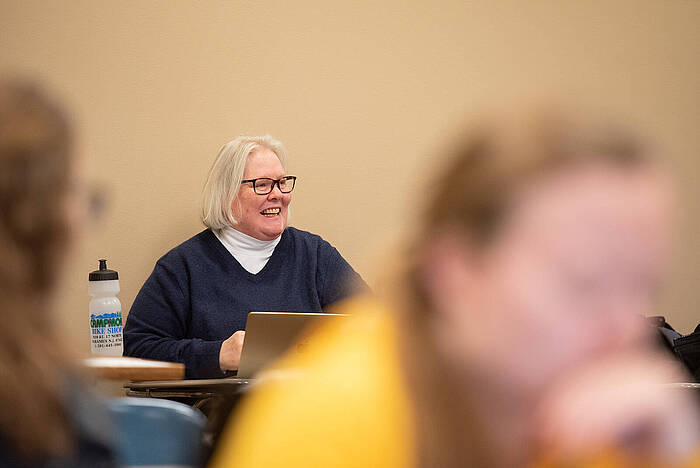
In a photo taken before the pandemic, NDSU associate professor Angela Smith teaches her students.
Angela Smith is an admired and respected instructor who firmly believes that students learn best by doing. Her classes in public history, digital history, museum studies and 20th century American history are active, collaborative and focused on students.
Smith organizes public history field schools at museums in small towns across North Dakota and western Minnesota, and she is now working on two projects: one that will document life under COVID-19 through oral histories and period focused collecting, and a Women’s Suffrage website that explores regional women and events that led to the passage of the 19th amendment.
She earned her bachelor’s degree at Belmont University in Nashville, Tennessee, and master’s degree in history and doctorate in public history from Middle Tennessee State University in Murfreesboro.
WHAT EXPERIENTIAL LEARNING OPPORTUNITIES DO YOU PROVIDE STUDENTS?
Almost everything I do is experiential learning. Every other year, we go to a small town and we do a museum make-over. I usually take eight-to-12 students on these field schools, and the students take the lead. They learn how to work with both their peers and the public. They evaluate the museum, formulate a plan, and present the plan to the museum board for their approval. That’s something every employer in the country needs – employees who can work with people, while being sensitive culturally and intellectually with multiple stakeholders.
Public history is a field that focuses on communicating history to a public audience. It includes the museum, archival, park service, historic preservation and many other public-facing historical professions.
HOW DID YOU DECIDE TO PURSUE YOUR TEACHING PROFESSION?
This is a second career for me. I worked in the graphic arts field for more than 20 years. But I’d always been interested in history, so I talked with people at Middle Tennessee State about public history. I started in a master’s degree program and eight years later had my doctorate. I finished my doctorate when I was 50. I landed this job in January 2012, and I absolutely love it here.
WHAT DO YOU LIKE BEST ABOUT TEACHING?
I love doing something that matters. Small community museums across this state need help. They don’t have professional staff. So, what I do with students matters. It’s a service, but it’s also a passion. I see the work as something that contributes to the greater good.
WHAT IS YOUR TEACHING PHILOSOPHY?
I try to teach my students the philosophy of “learn to learn.” I tell my students that if they don’t know something, be active, not passive, and try to figure it out.
I share with them the logic model and ask them to list their resources and figure out the best path from point A to point B. If they have a vision of where they want to be, they break it down in steps to get there. This could be an expertise, project partners or financial resources.
It sounds simple, but we need to teach students the skills to deal with contingencies. They have to learn how to come up with Plan B or even a Plan C. If we don’t do that, we’ve failed.
WHAT IS YOU FAVORITE THING ABOUT NDSU?
A lot of the people in our college are not from this place; we come from everywhere. I’m from Middle Tennessee. At NDSU, there’s a sense of belonging that is really welcoming and cathartic, at times. I feel like I belong.
The second thing is the nature of NDSU students. Generally speaking, they work hard and I appreciate their work ethic. The regional work ethic is impressive.